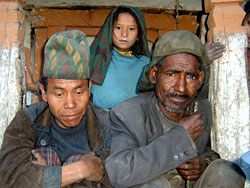|
|
| THE MORE THINGS CHANGE: For Humlis like Man Bahadur Budha, Jaltirkha Budha, and Mangite Sunar, peace without food is little consolation. |
When local Maoist leaders announced after April\'s Jana Andolan that students should return to Shreenagar\'s Suryodaya Secondary, the school\'s population more than doubled, as pupils and their parents stopped worrying about the institution being used as a recruiting ground. The rebels also stopped "taxing" teachers seven percent of their salaries.
"Previously they pressured us not to teach Sanskrit and moral education, saying the stories about the gods were untrue. They also said they would introduce a new curriculum, but they didn\'t do it," says head teacher Hari Gorkhali, sitting on a bench outside the school\'s hostel as the sun sank behind the surrounding hills late one recent afternoon.
Today, teachers in the high school that serves Shreenagar and four neighbouring VDCs in southern Humla are left alone to do their work and all locals can travel in and out of the village without getting permission after the previous 'chit\' system was abolished. 
But that doesn\'t mean residents are bursting with hope. "We heard about peace but we don\'t know how it will change things for us," says one man among a dozen villagers speaking with us. Like others, the man had to be prompted before admitting that positive things had already happened�like, for instance, the Maoists no longer force locals to carry their goods.
Reporters flew in to Humla on a helicopter chartered by the UN\'s World Food Program (WFP) to deliver rice as part of its $5.4 million emergency program to respond to last winter\'s drought in 10 districts. Two weeks ago, French NGO Action Against Hunger expanded its therapeutic feeding for severely malnourished children in 10 VDCs of Humla and Mugu to Shreenagar: children here are in worse shape than those already being treated, said one development worker based in the area.
"I\'d like to request the state, WFP and other donors to carry out a program of sustainable development," Maoist area-in-charge Lal Kesh Jaisi said. "The most important thing is food production, which needs irrigation," he added.
The request is echoed by other villagers who stand one-by-one to recount their hardships: inadequate rain, thin crops, poor schools, an empty sub-health post and discrimination by people in India, where many of them will go to work for wages until the winter wheat matures next spring�if the rain comes.
Still, Nepali Congress student leader Lokendra Bhandari tells a positive story. Seven years ago he left for Kathmandu after the Maoists threatened all political competitors. He returned a month ago. "There are still some small problems: Maoist leaders still act like they\'re in charge. But we\'re cooperating with the seven parties and the Maoists, and yesterday\'s welcome ceremony was a joint event," he says.



